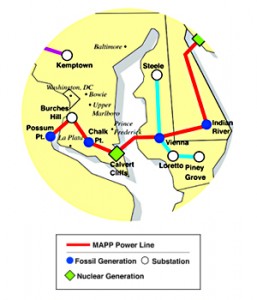MAPP transmission line under the microscope
September 26th, 2009
Before we get started, a note about need. As usual, this transmission line is not needed. PEPCO’s Mid-Atlantic Power Pathway, or MAPP line, not to be confused with Mid-Continent Area Power Pool (MAPP), is the red line on the map above. PJM, the private utility transmission promotion entity, has admitted that the Indian River to Salem part of the line is not justified, and have taken it off their wish list. Now, about the rest of it…
And where did MAPP come from? It’s part of Project Mountaineer, which is planned to bring cheap coal generation from the Amos plant and others, like the coal plant planned by Delaware Electric Co-op. Without this transmission line, the coal generation would not be used in the Mid-Atlantic or parts further NE, i.e., New York.
The MAPP transmission line had a day of scrutiny last week when MAPP opposition groups hosted a tour and luncheon featuring former Maryland Gov. Harry Hughes speaking against the line. State Senators and staff from both Maryland U.S. Senators were present, and it looks like they got an earful and eyeful! They used balloons to show the height of the lines, as we did in Susquehanna-Roseland last month, and Chisago years ago.
Here’s the full story:
Tour focuses on MAPP problems
By DUSTIN HOLT Special from The Star DemocratPublished: Friday, September 25, 2009 9:56 AM CDT
The Eastern Shore Land Conservancy and the Dorchester Citizens for Safe Energy along with the Dorchester County Tourism Department organized a tour through Dorchester County last week to show the impact the proposed Mid-Atlantic Power Pathway project would have on the county’s heritage, agriculture and wildlife.
Pepco Holdings is proposing a 27-mile high-voltage electrici transmission line crossing Dorchester County as part of the MAPP project, from Taylor’s Island to Vienna.
The ESLC suggests the towers would be 150 feet tall, though Pepco puts them between 110 and 130 feet. According to the ESLC, the towers would consume 650 acres of county agriculture, forest and rural lands.
The Sept. 16 tour included lunch at the E.A. Murphy Community Center in Vienna, with former Maryland Gov. Harry Hughes as a guest speaker.
“Many of us are opposed to it (the MAPP Project) because insufficient studies have been done for this line,” said Hughes, an advisory committee member of the ESLC. “Have they looked at alternatives?”
Hughes said one alternative is to improve the Vienna Power Plant, which is not operating at full power. He said another alternative is to introduce energy conservation standards to reduce the need for the power lines.
“This is a massive project that will disrupt the landscape,” Hughes said.. “There are too many unknowns with no alternatives considered. As far as I can see, there is no need to rush into this.”
Vienna Mayor Russell Brinsfield, one of the founders of ESLC, said MAPP would permanently and negatively impact Vienna. He said alternatives should include the state promoting energy conversation and renewable resources.
State Sen. Richard Colburn, R-37-Mid-Shore; Del. Addie Eckardt, R-37B-Dorchester; and Jeannie Haddaway-Riccio, R-37B-Talbot, were in attendance at the lunch in Vienna.
Eckardt said it is important to preserve the heritage and agriculture in the county, “Our biggest asset is our land, fisheries and agriculture.”
If MAPP project must move forward, Eckardt said, the state needs to look where the project will not be environmentally sensitive nor impair the landscape of the county.
The tour headed from Vienna, through Blackwater National Wildlife Refuge and back to Cambridge.
Dorchester Citizens for Safe Energy Chairman Libby Nagel said the power line would require about a 200-foot right-of-way.
To demonstrate the height of the towers, balloons were deployed to a height of about 150 feet.
Local farmer Lin Spicer said spraying crops would be ineffective with the power lines because planes would not be able to get below the lines. “We would be forced to spray from above the towers and the wind would blow the spray all around before it reached the crops,” he said.
Blackwater Manager Susan Baird said the MAPP towers would have a great impact on wildlife and wetlands. She said bald eagles need a living area of at least five miles. “They won’t fly over the towers, so you can’t tell me they or other birds will not move on to different locations outside of Dorchester County if the power lines are put here,” Baird said.
